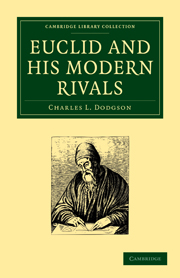Book contents
Summary
‘ridentem dicere verum
Quid vetat?’
The object of this little book is to furnish evidence, first, that it is essential, for the purpose of teaching or examining in elementary Geometry, to employ one textbook only; secondly, that there are strong a priori reasons for retaining, in all its main features, and specially in its sequence and numbering of propositions and in its treatment of parallels, the Manual of Euclid; and thirdly, that no sufficient reasons have yet been shown for abandoning it in favour of any one of the modern Manuals which have been offered as substitutes.
It is presented in a dramatic form, partly because it seemed a better way of exhibiting in alternation the arguments on the two sides of the question; partly that I might feel myself at liberty to treat it in a rather lighter style than would have suited an essay, and thus to make it a little less tedious and a little more acceptable to unscientific readers.
In one respect this book is an experiment, and may chance to prove a failure: I mean that I have not thought it necessary to maintain throughout the gravity of style which scientific writers usually affect, and which has somehow come to be regarded as an ‘inseparable accident’ of scientific teaching.
- Type
- Chapter
- Information
- Euclid and His Modern Rivals , pp. ix - xiiPublisher: Cambridge University PressPrint publication year: 2009First published in: 1879



